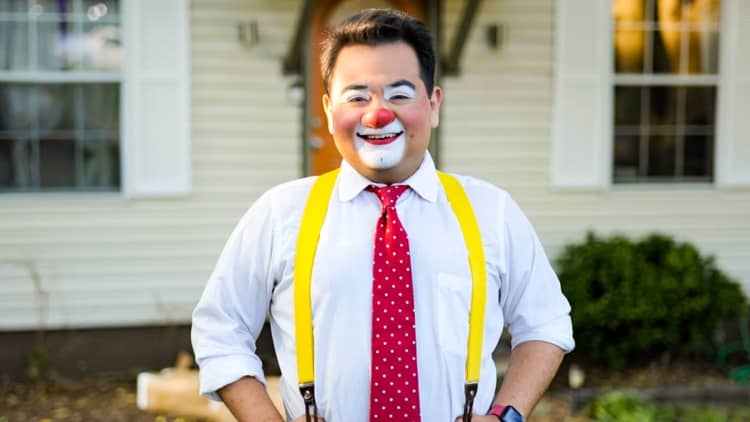This story is part of CNBC Make It's Millennial Money series, which details how people around the world earn, spend and save their money.
David Torres-Fuentes was 4 years old when he decided to become a clown.
Not a class clown — a working, performing clown.
"A clown came to my kindergarten class, and I was terrified," David, 23, tells CNBC Make It. "I scurried under a table and stayed there until he left. And my 4-year-old logic was, 'If I'm one of them, they can't get me.' So I'm basically like the Batman of clowns."
The logic was sound enough to his parents, who are both artists themselves, David says: "I went to my mom and I said, 'Hey, I want to be a clown.' And she looked at me and she said, 'Well, you better be the best clown you can be.'"
So far, David has lived up to that dream. As a kid, he researched the history and artistry of clown performance. He learned how to paint his face and adjust costumes to his style.
In high school, David got involved in musical theater and landed his first professional contract to perform. Once he graduated from high school, he went straight into working as an actor and performer.
Today, David and his wife, Jacquelyn, book parties as professional clowns through their new business, Abrakadabra Events, in Nashville. They work day jobs to fund their life and their business, living on roughly $43,000 per year. Here's how they make it work.
Getting into the clowning business
One of David's first professional bookings as a teenager was a two-hour magic show. It paid $50. "That was a lot for me," he says. "I thought $25 an hour was fine, because my friends were making $7.25 an hour."
Over the years growing up in Nashville, he got a better sense of what his time and expertise was worth after meeting more local performers and learning how much they charged.
"I realized, they're not just paying us for the time we're there. They're paying us for our experience," like his many years of dedication to the art form, he says.
Not to mention, he adds, "the props cost money and I need to get there. And so all of that prompted me to raise my prices to something that I am worth, and that people see that I'm worth and they will pay it."
David worked for several years with a talent agency, which helped him book gigs around town in exchange for a 10% to 20% cut of his earnings.
During that time, he grew his TikTok following and met Jacquelyn after she messaged him asking for advice on how to get into clown performing. The two married in 2022 and launched Abrakadabra Events, where they're hired to do balloon twisting, face painting, magic and science shows, foam and bubble parties around Nashville.
Abrakadabra Events' prices range from $140 per hour for balloon twisting to $525 for the deluxe magic package, which includes a 35-minute magic show, an hour of balloon twisting and an hour of face painting. Customers can also hire David or Jacquelyn to entertain and lead party games at $240 per hour. David's specialty is balloon twisting, and Jacquelyn has become an expert face painter.
The business grossed around $11,000 in 2022, but didn't turn a profit due to startup costs.
Side hustles
For the Torres-Fuentes family, making a living in the arts means cobbling together several forms of income.
Jacquelyn works as a barber and brought in roughly $32,000 last year.
During the week, David works as a puppeteer at the Nashville Public Library, which has put on weekly puppet shows for kids and families for more than 80 years. He performs as many as eight shows during a busy week and earns $16 per hour.
Working as a puppeteer is great practice for his clown routine. "There's no way to not get better when you're spending that much time herding children and making sure you're entertaining enough to keep their attention," David says.
He also works roughly 10 to 15 hours at a coffee shop each week, earning $15.50 per hour. Between the two gigs, he earned roughly $11,000 in the last year.
David and Jacquelyn run their business and put on parties on the weekends.
While the party business is booming from April to December, David says things slow down around the holidays when people are spending on gifts and travel. He and Jacquelyn pick up extra shifts at their side jobs through January and February to make ends meet.
How he spends his money
Here's how David spent his money, and what he and Jacquelyn spent on joint expenses, in April 2023.
- Discretionary: $2,211 on entertainment, travel, health and pet supplies
- Housing: $1,959 on rent and utilities
- Food: $839 on groceries and dining out
- Gas: $182
- Phone: $134
- Subscriptions and memberships: $87 for a YMCA membership and AppleCare
The $5,412 total includes the couple's joint expenses, as well as the $1,569 David spent on his personal credit card for the month. Jacquelyn did not share her discretionary expenses for the month.
Aside from housing and bills, David's favorite way to spend his money is on entertainment, especially to see shows at the Tennessee Performing Arts Center. He tries to see shows three times a month and will sometimes get free or discounted tickets through his network of friends and fellow performers.
His April spending was a little higher than usual because he splurged on a nice dinner with friends who were visiting, covered unexpected health expenses and booked a flight for an upcoming trip.
From two suitcases to building generational wealth
David and Jacquelyn have big financial goals. In addition to building up their business, they aim to stay on top of saving for retirement. David estimates he puts away between $100 and $500 toward his Roth IRA most months, and he hopes to max it out by the end of the year. He and Jacquelyn also plan to start a 401(k) for their business as it grows.
The two try to stash away anything left over at the end of the month to build up their emergency fund. They eventually want to boost their savings for a down payment on a house.
"Generational wealth is really important to us," David says. He spent his early years in Mexico before he, along with his parents and brother, immigrated to the U.S. when David was 6.
"When my family and I moved here, it was four of us, and we had two suitcases," he says. "We essentially had nothing," he says, recalling his family living paycheck to paycheck. "My parents were incredible with what they were able to do."
David credits his parents as playing an "integral part in teaching me financial discipline." They helped him develop strong values around working hard to make a living, while also doing work he is passionate about. He says his parents allowed him to live at home rent-free as long as he was in school, and "if I needed something while I was still in the house, they would help out."
He moved out when he graduated from high school and began working, but says he and his parents remain close (they live in the area and talk on the phone often).
"My parents really taught me the worth of a dollar," he says. "That's what I hope to do with our future generations."
Clowning into retirement
These days, David considers himself "decent with money" and has a team of financial professionals to help manage his business and personal funds.
"My wife and I can live comfortably in Nashville with our salary, mainly because we have a large support system here in town and people help us," he says.
While they've called Nashville home for many years, they're also open to moving away at some point — Jacquelyn is interested in spending time in Scotland in the future.
Wherever they land, David hopes to continue making clowning and performing his lifelong career.
"When I think about retirement, I hope I can still be clowning and I can still be performing and bringing happiness," he says. "We like to say we bring whimsy and wonder to people. And that is probably the closest thing you can get to real magic."
What's your budget breakdown? Share your story with us for a chance to be featured in a future installment.
Want to be smarter and more successful with your money, work & life? Sign up for our new newsletter!





